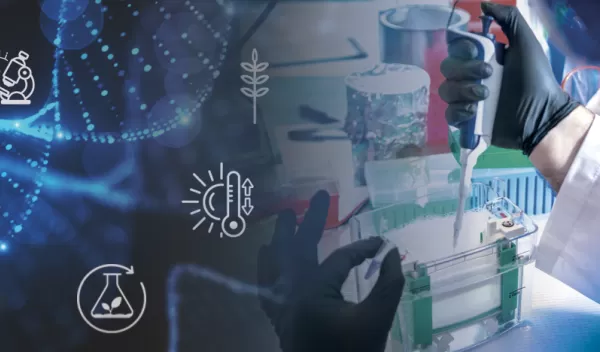
NSF uses Rules of Life research to address societal challenges, from clean water to climate change
The U.S. National Science Foundation has announced funding for 12 projects under the Using the Rules of Life to Address Societal Challenges program. Totaling over $27 million in investment, this funding supports the use of knowledge learned from studying the Rules of Life — the complex interactions within and between a broad array of living systems across biological scales, and time and space — to tackle pressing societal challenges, including clean water, planet sustainably, carbon capture, biosecurity and antimicrobial resistance to antibiotics.
"The enormous opportunity to apply biological principles to solving the biggest problems of today is one we cannot take lightly," said Susan Marqusee, NSF assistant director for Biological Sciences. "These projects will use life to improve life, including for many underprivileged communities and groups."
Researchers will work towards using various biological systems to monitor contaminants such as heavy metals and PFAS in drinking water; improving food security by increasing soil nitrogen and developing wheat that is more resistant to disease and tolerant of drought; enhancing carbon capture in forests through the use of environmental DNA; developing techniques to use synthetic biology safely; borrowing risk management strategies from living systems for use on societal risks; and creating "protocells" to measure micronutrient deficiencies in undernourished populations to name a few.
This use-inspired research will be translated into societal impact through engagements with resource managers and community representatives, as well as through education, training and outreach efforts. Several awardees will work with underserved populations, including Indigenous tribes, rural communities and urban populations impacted by drinking water crises, and groups underrepresented in STEM. The institutions represented include a historically Black college and university, a Hispanic-serving institution, an Asian American and Native American Pacific Islander-serving institution, and universities within EPSCoR jurisdictions.
The awards are:
- Applying Rules of Life to Forecast Emergent Behavior of Phytoplankton and Advance Water Quality Management: Virginia Tech, award 2318861; and University of Florida, award 2318862.
Researchers will use biological principles to predict phytoplankton blooms that negatively impact crucial, freshwater supplies, allowing water resource managers to protect those supplies.
- Biosensors for Field Detection of Aqueous Heavy Metals: A Collaboration With Native American Communities: University of New Mexico, award 2318897.
Researchers will collaborate with Native American and Indo-Hispanic groups to better detect heavy metal contamination of decreasing drinking water resources on the Navajo Reservation and elsewhere.
- Using Rules of Life to Capture Atmospheric Carbon: Interdisciplinary Convergence to Accelerate Research on Biological Sequestration: University of Oregon, award 2319597.
Researchers will combine environmental DNA, artificial intelligence and Indigenous knowledge to enhance biological carbon capture over a five-county area of Oregon, develop improved forest management strategies and expand opportunities for Indigenous communities.
- The Design, Development and Societal Impact of Rapid, In-Home, Water Quality Biosensors: Northwestern University, award 2319427.
Researchers will develop a set of biological sensors to detect lead, copper and PFAS in drinking water within urban communities, thereby informing and improving community mitigation strategies.
- Co-Producing Knowledge, Biotechnologies and Practices to Enhance Biological Nitrogen Fixation for Sustainable Agriculture: Georgia Tech and Worcester Polytechnic Institute, award 2319430.
Researchers will address food security through low-cost technology based on biological principles to increase nitrogen content in soils and improve crop production on marginal lands.
- AI-Supported Bionic Bivalves for Surface Water Monitoring based on Freshwater Mussel Response to Environmental Change: North Carolina State University, award 2319389.
Researchers will combine environmental sensors on freshwater mussels and artificial intelligence to monitor water quality and identify possible contaminants, thus aiding in decontamination.
- Next-Generation Biological Security and Bio-Hackathon: Georgia Tech and Massachusetts Institute of Technology, award 2319231.
Researchers will create programmable, biological combination lock methods — "on and off" states — for using synthetic biology safely, containing potentially dangerous organisms and protecting valuable ones.
- Using the Rules of Antibiotic Resistance Development to Inform Wastewater Mitigation Strategies: University at Buffalo, award 2319520; Iowa State University, award 2319521; and Virginia Tech, award 2319522.
A team of researchers will examine whether conditions in wastewater are increasing microbial resistance to antibiotics.
- Microbiome-Mediated Plant Genetic Resistance for Enhanced Agricultural Sustainability: Oregon State University, award 2319568; and Purdue University, award 2319659.
Researchers will collaborate with tribal and non-tribal farmers to develop new approaches that improve disease resistance in wheat, particularly in the Pacific Northwest, thereby improving agricultural sustainability.
- Determining the Relationship Between Genes and Ecosystem Processes to Improve Biogeochemical Models for Nutrient Management: Johns Hopkins University, award 2319123; Howard University, award 2319124; University of Maryland Eastern Shore, award 2319125; and William & Mary, 2319126.
A team of researchers will work with water managers and conservation groups to develop new, gene-based strategies to understand large-scale nutrient management in ecosystems including the Chesapeake Bay.
- What Rules of Life Allow Collectives to Effectively Manage Risk? Understanding the Rules Underlying Risk Management Across Systems to Increase Societal Resilience: Arizona State University, award 2319438.
Researchers will compare a variety of risk management strategies from living systems and develop novel ways human society might better manage risks like natural disasters, climate change and pandemics.
- Synthetic Protocell Communities to Address Critical Sensing Challenges: led by Georgia Tech, award 2319391.
Researchers will create synthetic "protocells" enabling the development of a highly sensitive, field deployable analysis system that can be used for many applications such as measuring micronutrient deficiencies in undernourished populations.
Learn more about the Using the Rules of Life to Address Societal Challenges program and find a full list of awards at nsf.gov.


